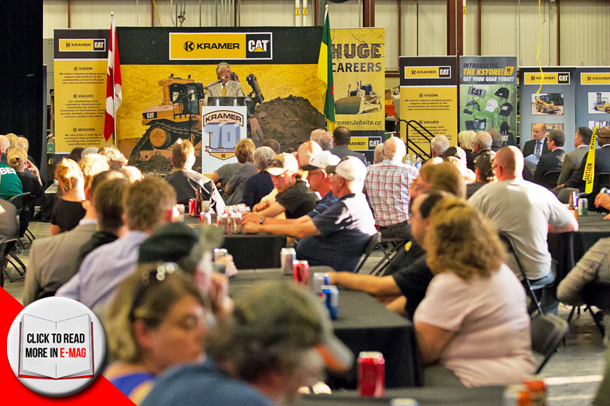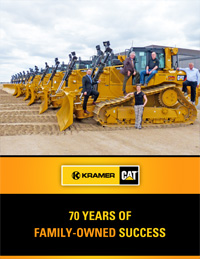70 years of family-owned success
By Cheryl Long
Technology is the driver of change for most industries, and Kramer Ltd. is no exception. Well-known in Western Canada as the Caterpillar dealer for the province of Saskatchewan, the family-owned company has its roots planted firmly in history but looks to innovation as the company advances into the future.
Three generations of the Kramer family have played an important role in the company’s progression. Celebrating its 70th anniversary this year, the business was founded in 1944 when Robert A. (Bob) Kramer purchased the Albert Olson Co. Ltd., the first Caterpillar dealership in Saskatchewan. Bob’s eldest son Don, who started in the industry operating tractors during the summer for his father’s construction firm, became president of the company when his father retired in 1980. In the meantime, the third generation of the Kramer family had joined the family business. Don’s son Timothy started working for Kramer Tractor Ltd. in 1978 after graduating from the University of Saskatchewan. In 1991, Timothy was named company president as Don became chairman of the board. That same year, the company changed its name to Kramer Ltd., reflecting a wider range of products and services.
There are few who wouldn’t recognize Caterpillar’s trademark “Caterpillar Yellow” machines and signature CAT logo. The U.S. company is the world’s leading manufacturer of construction and mining equipment, diesel and natural gas engines, industrial gas turbines and diesel-electric locomotives. From children’s sandboxes to massive construction sites, the renowned Caterpillar machines are everywhere.
Locations throughout Saskatchewan
Today, Kramer Ltd. has seven locations throughout Saskatchewan, including their head office in Regina. In 2010, they doubled the facility’s capacity with a 35,000-square-foot expansion that allowed the location to serve as a major repair and rebuild centre, and also provide space for a training facility and additional offices to accommodate the company’s growth. They operate across a number of sectors, including construction, which is their primary industry, mining, oil and gas, forestry, landscaping, material handling, on-highway trucking, electrical power generation and agriculture.
Bob Perry joined the company 37 years ago as Chief Financial Officer, just as the founder was stepping aside. He has seen Kramer undergo generations of change and points to technology as having the biggest impact on the industry, and also how Kramer sets themselves apart from similar organizations. “I’m an accountant and I used to be one of the guys with the little green shades… now it’s all very automated,” he said. “It’s the same throughout the organization. If you’re in the parts department, they’re using technology to stock the right part at the right time. Every technician has a laptop attached to a toolbox. The advancement in technology has been truly amazing.”
Their Equipment Management (EM) Solutions program has changed the way customers can monitor the lifecycle of their machines. Data analysis provides information about the location, utilization and condition of their equipment, which helps to detect problems before a major overhaul is needed. The benefit is a reduction in downtime and lowered repair costs.
Employee development key to success
But innovation isn’t limited to machines. As a service-focused company, Kramer’s people are front and centre and that means developing a team that best represents Kramer’s dedication to building strong customer relationships. Kathy McCrum joined Kramer two years ago as Vice President of Human Resources and has seen a shift in the organization’s culture when it comes to employee development.
“We’re realising that we need to develop our people and we need to be doing a lot more in terms of continuous improvement internally, so that our people are equipped to deal with customers differently,” she explained. “The customers have changed so much, even in the last 15 years … so we need to equip our people to be able to manage that. It’s all about getting your employees in the right mindset to be able to put them in front of your customers.”
Training initiatives, a new performance management program, improved communication strategies and employee engagement surveys are among the tools used to build a strong team company-wide. So far, results have shown a seven-per-cent increase in employee survey participation in the past year alone, and it reflects a positive trend among staff who are increasingly engaged in providing feedback.
Kramer has also launched a leadership development program that provides training for all supervisors and managers, developed an orientation program for new hires and are halfway through the rollout of a system that will handle payroll and human resources services, McCrum said. No small feat for a company with a staff of 515, they also introduced a pay-for-performance system and a new formalized salary structure this year.
Canada’s Best Managed since 2009
These are the types of measures that have helped Kramer earn a spot in one of Canada’s leading business awards programs. In 2009, the company celebrated another accomplishment when they made the Canada’s Best Managed Companies list. Sponsored in part by Deloitte, the awards recognize excellence among Canada’s privately-held companies. The status has raised the company’s profile, Perry said, and it reassures customers that Kramer is well managed. “We’re a good company and we rank high in Canada,” he added.
Being on the list is also helpful from a recruitment perspective, McCrum said. Often included in the job posting, it’s one of the company’s attributes that jumps out at employment candidates. That can be beneficial in an industry where recruitment can be a challenge. Hiring skilled labour, particularly heavy duty and journeyman mechanics, means Kramer has to be creative in the way they attract and retain experienced talent, she explained.
Making safety a priority is one way Kramer attracts high quality candidates, but it’s also important to their customers. When a Kramer truck rolls up to a job site, they know that the work will be done under the safest conditions. In 2013 Kramer received their Certification of Recognition (COR), a national standard in the construction industry. The certification not only reassures their clients but demonstrates the company’s commitment to ongoing improvement.
Superior service is another area of priority for Kramer, which also means being responsive to major changes in customer needs. Today, clients prefer to rent rather than buy heavy machinery and it’s a shift that’s growing dramatically, Perry said. Prompted by the economic downturn of 2008, the trend continues today. “We pride ourselves in really catering to our customers and one of our missions is to make our customers more profitable and we live by that,” Perry said.
Today’s customers are vastly different
Whether it’s sales, rentals, service or customer support, building strong relationships is the cornerstone of the business. But it’s not as easy as it used to be, McCrum explained. Decades ago, the company was much smaller and deals were often made based on friendships and trust. Over the past 10 years, the demographics have changed. “We are seeing more customers walk through the doors knowing what they want, and with the expectation of instant service and stock availability.”
“It is just as much about relationship building as it ever was, however, there is less time available to captivate and cultivate the relationship, making it more challenging,” she said. “We are adjusting through implementation of a new sales culture. Training and communication are key to the success.”
Growing and evolving is the long-term plan for Kramer as they work to increase their presence in the marketplace. Though they have a very strong hold in the mining industry, the focus is on becoming the dominant player in the province, Perry said.







